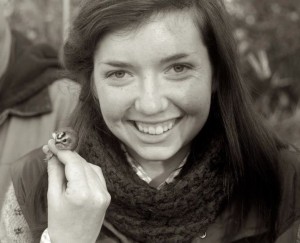
One of my first weekends at Middlebury, a friend and I ran up Chipman Hill. As we reached the top, both of us grew quiet. Taking in the vast expanses of the patchwork landscape – the Green Mountains to the east and the Adirondacks to the west – I stood in awe of the place I would grow to call home for the next four years.
From my freshman year, the combination of the natural beauty of Addison County and a curiosity to understand it led me to the study of Conservation Biology. Throughout the campus, and especially as an Environmental Studies major, we often engage in conversations around sustainability. As a budding ecologist, climate activist, and a steward of our natural world at Middlebury, sustainability is more than an oft-repeated buzzword across Admissions brochures. It’s a guiding principle we live every day.
Derived from the Latin word sustinere – to hold up, support, and endure – sustainability at Middlebury is a forward thinking principle that acknowledges the future consequences of today’s human impacts, the interconnectedness of natural and human communities, and the moral obligation to support future generations.
Take my BIOL 0302 class, Vertebrate Natural History with Steve Trombulak. You wake up at 5 in the morning. It’s pitch black. You slowly crawl out of bed, throw on as much wool as you can find, and walk into the biting cold to set out mist-nets. Minutes later you’ll walk the lanes of nets, hold in your hand a Black-capped chickadee, a White-throated sparrow, or maybe a bright red male Northern cardinal. That same afternoon you might go out to Lewis Creek to electrofish or set up Sherman traps to collect a flying squirrel in Cornwall. Or take BIOL 323, Plant Community Ecology, when we hiked through the old-growth hemlock-pine forest of the Battell Research Forest, measured the invasion of European buckthorn and Eurasian bush honeysuckle, and traced the changes in forest composition along an altitudinal gradient.
At Middlebury, our professors do not treat us as students in the traditional sense, but as apprentices in the craft of each field of study. Middlebury students are budding mathematicians and economists, future surgeons and psychologists, or emerging marine biologists. When we learn about how to protect species diversity, conserve natural habitat, and protect wildlife corridors, or the importance of breeding grounds, pollinators, and seed dispersal pathways, this knowledge is not theoretical. It is the work of the future.
All Environmental Studies majors participate in a capstone seminar course which is both project based and in conjunction with a community partner. The theme of this spring’s senior seminar is “issues in transboundary sustainability.” I’m working with a team of five other ES majors each with a unique focus. We are students of political science, economics, biologists, and geographers looking to understand the cross-jurisdictional regional prevention of aquatic invasive species in Lake Champlain. While our professors and community partners are here to guide us with academic support, resources, and expertise, the whole project is ours. Inspired and enriched by this project-based philosophy, we are able to pursue solutions with curiosity, self-discovery, and collaboration.
Four years after beginning my study of conservation biology, the top of Chipman Hill is more familiar. What was once a vast expanse of space has been transformed into place, both personal and specific.
When I arrived at Middlebury, I fell in love with the forested landscape of Vermont with no real regard for its natural history, inhabitants, or processes. Four years later, Addison County is no longer a “landscape” but a place, endowed with value and meaning as I have experienced more attachment to this community. Walking around campus bird songs are no longer undifferentiated calls as I have learned the tones and rhythms of their chirpings. The forest is no longer filled with “trees” but individual species, each with taxonomic nomenclature and natural history. At the top of Chipman Hill, I no longer only see a view, but become a part of what Aldo Leopold pens as the sensory experience of the “theatre of evolution.”
I never thought I’d ever call going back to Middlebury “coming home.”
